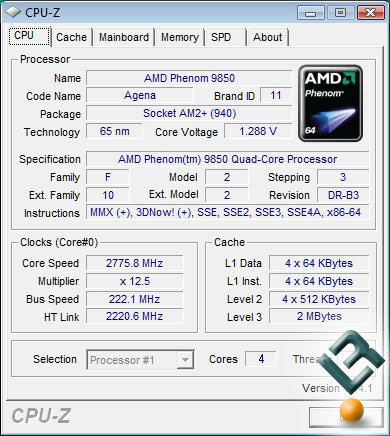AMD Phenom X4 9850 Processor Review – B3 Stepping
Overclocking Results
Overclocking greatly varies due to what hardware is being used and who is doing the overclocking. Always remember that no two pieces of hardware will perform the same, so our results will differ from what you will might be able to get.

With stock BIOS settings, the AMD Phenom 9850 processor runs with a 200MHz bus speed and has a 12.5 multiplier that are used to reach the final core clock of 2.50GHz. As you can see above, the MSI K9A2 v1.0 motherboard runs at 200.0MHz, so the clock frequency is spot on. Let’s start off by overclocking without adjusting any voltages to see what the Phenom 9850 quad-core processor can do out of the box.

The MSI K9A2 v1.0 motherboard BIOS is very simple to use with the ‘CPU FSB’, ‘HT Ratio’ and ‘CPU Ratio’ all ready to be set. For this test we adjusted just the CPU FSB to find the highest frequency we could hit and then tried changing the CPU Ratio (divider).

The Phenom 9850 acted just like the older B1 and B1 stepping Phenoms and topped out at just over 220MHz on the bus. At 222MHz x 12.5 the final frequency of the processor was 2.77GHz, which is 270MHz over the stock frequency of 2.50GHz. With the bus speed set to 200MHz we were able to take the divider up to 14, which means 2.80GHz was reached. Not bad for leaving everything in the BIOS on ‘Auto’ other than just one setting! Expect to get about 250-300MHz out of a Phenom 9850 with no voltage changes.

When it came to cranking up the voltages and going for the gold we took the CPU voltage to the max (1.59Vcore) and was able to reach 2.97GHz by increasing both the bus and multiplier on the Phenom 9850. The final result was an overclock of 470MHz. The original Phenom 9900 that we looked at back in November could do 3.06GHz at 1.45V, so reaching 2.97GHz is close to the best we have ever seen with Phenom. Since we were not able to top our previous best it can be fair to assume that the B3 overclocking should be very close to that of previous versions.

When it comes to benchmarks, the move from 2.50GHz to 2.97GHz increased performance by 25%, which is great considering the overclock was only 18%.

Comments are closed.